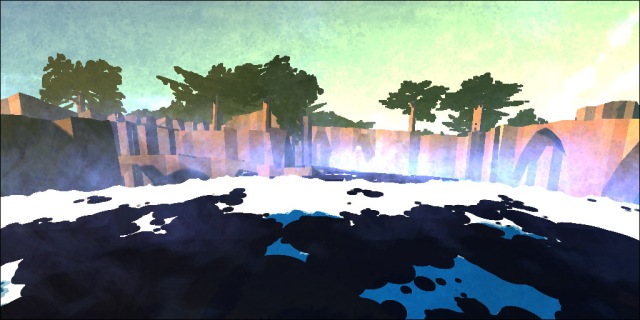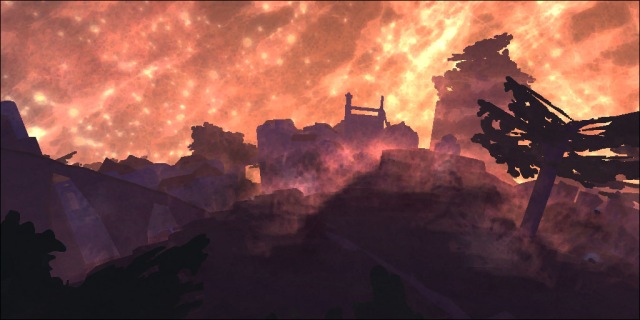Love is a First Person, Multi-Player Online Game (MOG) in development which focuses more on building the world, changing it, meet new people you can actually bound with, build settlements, search for new technologies and using them.
This massive project is being developed by one man named Eskil which became a role model for many game developers.
In Love you don’t compete against other players, the players compete against the A.I (Artifact Intelligence)
Love is NOT a Massive Multi-Player Game (MMO), each server will have a max of 300 users only, so there will be much less people online at all times thus the connection between the players will be much stronger.
This fact leads to “economical” problem – this game will be “pay-to-play” because with the limited number of people in each server it would be very costly to “serve” people for free.
The world won’t be huge thus you won’t feel alone as some MMO games with big territories and small number of players at “sleep hours” .
“Love” wants you to feel responsible for the world thus you can’t just move to a different server (world) once things go bad or there is a player you don’t like, it is however possible to move to a different server but it comes with a cost.
The “build” system is just amazing (at least from the in-game videos that I’ve seen) , you can deform a terrain, build structures and defense around your settlement, build transportation and blow up things.
The graphic is “cartoonish” and yet beautiful with “home made” engine.
About the game
Love is everyone
This is a game to play with your friends, and for them to play with their friends. Never enough to be crowded; never so few to be alone. You can make your mark, but as in life, it’s not a contest. It’s not about who you are; it’s about the things you do. There is a small planet waiting for you to explore. There is an empire waiting for you to overthrow.
Love is evolving
The world is worth changing, so get on with it. Take your mates and make your planet whatever you want it to be. Some of it is yours, and some is your friends. Some just happens by itself. Sometimes it disappears and makes you sad. But then again, you know that kind of thing can’t last. It’s a balancing act between love and loneliness.
Love is an endeavor
What could be better than you and your mates on an adventure for the benefit of everyone? Play whenever you want, make your mark, then come back later and see how it’s changed. There is always something new to discover, someplace you haven’t seen. Love is not a casual thing you need to take seriously – it’s the most serious thing, in a casual way. If Love isn’t easy, you’re doing it wrong.
Love is yours
You won’t be told a story, but you will get to live one. It’s not what is given to you, it’s what you do when you hold it. The more you give, the more you get. Love your planet, and everyone who’s on it. We know you can, so just go for it. It’s the right thing to do, and you know it.
Love is being developed by Eskil alone, without funding or support. He is responsible for all code, design, networking, engine, art, pipeline and tools. More than just being an experiment in game design, Love is also an experiment in how games can be developed drastically more efficient using technologies like Verse, procedural generation, new tools and a host of other clever solutions.
Story
Love is not telling you a story
Stories in games are rigid and stale, because no team, no matter its size, can create content for all the things players may want to do. Stories are prepared long in advance and is something you follow, not something you create. Love is different.
Love is the story
In Love the story is not something that is “Pre-scripted” but something that is organically created while you play. By using Procedural algorithms the game can constantly generate new events and content for you to explore. By being generated while you play, the experience can be tailored to your play style and respond to your actions. This is not a game where you are being lead down a path, this is a game where you decide the direction of the story.
Stories are all around
If you have ever played a multiplayer game you have stories, stories of how you where the last survivor on your team, stories of how you captured the flag just before the timer ran out, stories of luck and failure. Love takes that kind of emerging story creation and expands it to a long lasting canon. Love is not a game you beat, is a world that is constantly changing. The game ebbs and flows, and how the story of the game proceeds depends on how the players respond to what the game does. Characters will remember what you do and it will color their views of you. Loves characters are driven by a innovative “Emotional” AI that can react to your actions with an emotional core. They may fear, hate, be curios, sad or even love other characters. Chose your actions well, they may give you both allied and enemies.
All you need is to nurture it
The game is based on a powerful procedural engine that creates a dynamic world that can be changed over time by players, characters, and the passing of time. The game can generate new landscapes, buildings, cities, secrets, characters and even networks of infrastructure and puzzles. With these tools the game has all the necessary components to create new story structures of adversity, glory and tragedy. If game chooses it can dynamically build a new city, introduce new characters or generate puzzles as the players are playing the game. To strengthen the lore of the game, important events and people will give name to places, Your actions will leave the trail of what you build or the ruins of what you destroy. As you return again and again new events will have created new things to discover, something made by either man or the passing of time.
Gameplay
Love is easy
Love is played form a first person view, because you should see the world not yourself. The controls of Love are designed to be a simple as possible to let you engage more in the story. Not dumbed down, but purified. All the mechanics designed to act as story devices to help the narrative. Each server has about 200 people registered, but as the same people comeback again and again you can make friends and get story continuity. With so few players you can get to know most of them and you can matter to the world. When you go to play Love its not just to see what is going to happen, its to see what has happened since your last play session too.
Shared World
In the world you can find a “Token” that lets you create a settlement. In this settlement the terrain is deformable so that you can build houses, caves of what ever else you want. Other players ca join your settlement to help you develop it and protect it. When you go out in the world you can find other tokens that you can put in your settlement giving you new tools and things you can build. Once a token has been placed in a settlement any one in that settlement can use it so all resources are shared among the community. If you bring in new Tokens to the community it will matter for everyone not just you. This system forms the basis of the social gaming structure of Love, as players are never competing against each other and are always playing against AI characters.
Building Structure
The building system lets you not only deform the terrain and place out object like trees, it also lets you lets you create infrastructure. Various object can be connected to work together by setting Coordinates, Radio frequencies and keywords. For instance you can set up a sensor, that sends a keyword over a radio frequency to open a door. This system is also used by infrastructure built by AI characters. By studying infrastructure the players can “hack” it by sending commands over the right frequencies. This system lets players build intricate relation sips, but it also sets up plot as the players will need to manipulate enemy installations, like deactivating shields, opening doors, and cut power to enemy weapons.
Features
Genre: First person not so massively multi player online procedural adventure game.
Engine: Custom highly optimized graphics engine with distinct “concept art” look.
Terrain System: Procedurally generated spherical, multi level height fields. Landscape, Building and City generation
Editing: Environment editable from within the game, fully destructible environments. Anything you can see you can be built and destroyed
Hardware requirements: win32 (possible Linux and OSX port) OpenGL, 512 meg ram, 1.5 GHz CPU, ATI RAdeon 9800 or better. Made to run on avrage Laptop
Pipeline: Realtime WYSIWYG verse connection. Loq Airou, Co On, Verse Export tool.
Characters: Fully procedural characters, creatures and robots with seamless environment aware procedural animation.
Simulation: Particle systems, fog, Cloth, Watter, wind, Day/Night cycle, and vegetation.
Networking: Low latency UDP networking for hundreds of players per server.
Biz Model: Pay-to-play. Prize to be determined
Developer: Quel Solaar
Release date: When ready.
Screenshots :





Interview with Eskil hopefully coming soon…

I hope it keeps the neat art style. looks like it could be the first game i’d pay money for on linux.